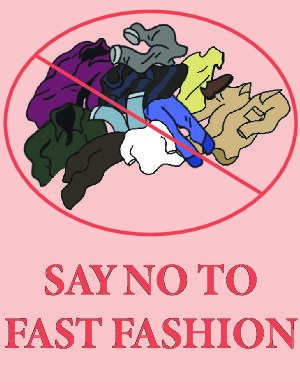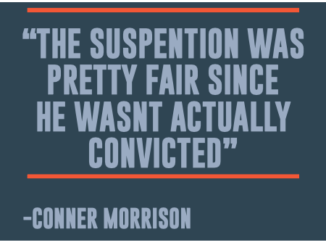
photo credit: Mia Harrington
In 2023, the fast fashion industry’s market was worth over $122 billion, and is projected to increase $60 billion by 2027, according to data by Statista. This increase in consumption is a result of newly popular brands such as SHEIN, FashionNova, TikTok Shop and several others.
The term fast fashion involves clothing brands that partake in rapid design, production, and distribution of products, usually sacrificing quality and producing insanely large quantities of clothing in a shockingly short amount of time.
There are several problems with fast fashion brands, the largest being their environmental impact. The large yield of clothing that these brands produce is being wasted, as according to Earth.org, 85 percent of the clothing created ends up in landfills.
We believe that celebrity partnerships between celebrities and million-dollar fast fashion brands are harmful. These partnerships do nothing but produce further revenue for already-established names, essentially promoting the dangerous environmental practices and mistreatment of garment workers that these companies stand for.
According to The New York Times, investigations conducted in 2016 revealed FashionNova clothing was being made in factories that were paying their workers under $3 an hour. The same factory owed millions of dollars in wages back to their workers.
This wasn’t the only example of problematic instances involving FashionNova, as there have been several repeated violations since the investigations.
Later, in 2018, Cardi B released a clothing line partnering with the company. This was arguably one of the most iconic and successful partnerships, generating over $1 million in revenue within the first day, according to The Crimson.
Although the purpose of partnering with FashionNova was to provide an affordable product for her fans to purchase, it caused customers to increase the revenue flowing into this harmful company.
SHEIN, another famously harmful fast fashion brand with its fair share of controversies, had a partnership with Khloe Kardashian in 2021.
The partnership gave emerging clothing designers the opportunity to design clothing that could be sold on SHEIN’s website, according to Daily Mail. Kardashian did receive a considerable amount of backlash due to SHEIN’s reputation of design stealing from small businesses to sell on their website at a cheaper price.
In the past, very few celebrities have spoken out about the negatives of fast fashion brands. However, last month, newly popular artist Chappell Roan spoke out against H&M following their request to partner with her brand.
Roan voiced her disapproval of brand-deals, particularly with fast fashion brands, saying that companies like H&M do not ‘belong in this world’ and the money only goes to ‘world building’, according to Business Insider.
But Roan is not the only one vocal about this issue; Billie Eilish has also spoken about making sure her merchandise is sustainable and high quality. According to Billboard, she says she wants to make sure clothing is made ethically and with good materials.
Instead of partnering with billion-dollar fast fashion companies, celebrities should take advantage of the huge influence that they have and use it to promote and partner with small businesses. Small businesses often focus on more sustainable practices, which could help create a cultural shift from large corporations that are doing damage to our environment. Not only would it provide much-needed visibility for the businesses, but it would also improve the celebrities image and show authenticity.


